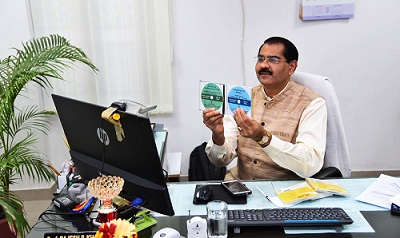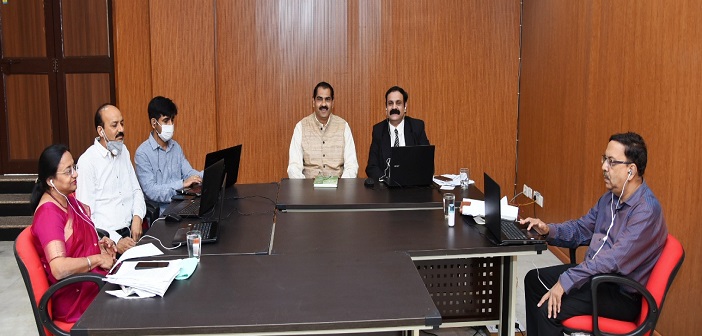The Pandit Sundarlal Sharma Central Institute of Vocational Education (PSSCIVE), Bhopal on the occasion of their 27th anniversary, organised a national webinar on repositioning TVET post-COVID-19, new approaches and solutions.
Technical and Vocational Education (TVET) plays an important role in the coping phase, intermediate phase, and post COVID-19. As the TVET curriculum is majorly practical based, it became difficult for TVET institutions to cope with changes. Therefore, there is an urgent need to reposition TVET post-COVID-19 with new approaches and solutions
In this webinar, all the speakers shared their experience and ideas about repositioning TVET and provide new innovative ideas and solutions for coping with the changes. The webinar was launched by Dr. Rajesh Khambayat with an address on the occasion the 27th Anniversary of PSSCIVE. This was followed by the keynote address by Dr. Prof. Hrushikesh Senapaty, Director, NCERT. Dr. Vinay Swaroop Mehrotra, Professor and Head CDED, Dr. Saurabh Prakash Professor, Dept of Engineering and Technology, PSSCIVE; moderated the technical sessions and Dr. Pinki Khanna, Professor, PSSCIVE proposed the vote of thanks.
Kindly note: You can watch the video below to go through all the presentations or go to the specific speaker by referring to the duration mentioned against the name of the speakers.
Dr. Rajesh P Khambayat, Joint Director, PSSCIVE, Bhopal (video – 9.35 – 21.52)

“PSSCIVE is one of the leading institutes in Vocational Education and Training. It essentially plays four roles – Advisory, Research, and Extension, Development, and Training. We envision to be a leading organisation to strengthen VET to meet the challenges of the future. With a mission to strengthen the capacities of VET institutions and aim to VET professionals in preparing a skilled workforce for the 21st century and to promote synergistic partnership between VET organisations and agencies.”
To commemorate the occasion, Dr. Rajesh Khambayat launched digital learning content for a few subjects across 17 job sectors. This is intended to help the learners from home and continue their programs to acquire new skills or upskill themselves.
“Some of the major initiatives undertaken by PSSCIVE are, vocationalisation of school education – Samagra Shiksha, setting up a Vocational Demonstration Multipurpose School (India – Korea project), innovative Vocational Education and Training in Schools (IVETiS) Programme (MHRD funded project), introduced greening TVET launched Diploma program on VET, capacity building training for TVET an official from Bhutan, Sri Lanka and APACC, skilling children who are in the formal education developed pre-vocational in school education and developed Beauty and Wellness program in collaboration with KRIVET South Korea. In the coming year, we will be launching a Mechatronics program in collaboration with KOICA, South Korea. To meet the current educational demands, we are developing digital content. Overall, we are conducting training programs, preparing the course books, etc. for 17 job sectors and 152 job roles.”
Prof. Hrushikesh Senapaty, Director, NCERT (video – 24.50 – 40.45)
“Our mandate is to conduct research in the field of education to improve its quality. Traditionally vocational education and training have been looked down upon. However, the government has started taking steps towards changing this attitude and also established a new Ministry.
We have selected 10 schools to conduct research and experimenting with strategies to improve the quality of education and vocational education. Currently, we are providing vocational education for 1000 hours, which we plan to extend to 2000 hours. We are also conducting training programs for vocational teachers.
During the COVID-19 pandemic, we created an alternative academic calendar. This helps students learn at their homes with the help of parents under the teacher’s guidance.
We should come up with learning outcomes for vocational education too. So that children are provided with right education and knowledge at home just like how they would have at schools. We must be able to provide them with content in the form of audio, video and also reading material. Our focus should be on competency skills and come up with good material in the form of audio and video also to support this.”
Highlights from the panelists in the technical sessions:
Dr Shyamal Majumdar, TVET Expert, and Advisor, Former Head, UNESCO-UNEVOC: TVET in the time of COVID-19, challenges, and opportunities ( video – 55:20 – 1:20)
Dr. Shyamal Majumdar spoke at length TVET in the time of COVID-19, challenges, and opportunities, and said that we are confronted with four major crises. This includes health, learning, economic crisis, mindset crisis. Hence it is important to understand how each country is facing it in innovative ways since TVET can’t be left behind. Since ‘before’ and ‘after’ COVID-19 have to been seen two different worlds, today it has become absolutely essential for institutions to be flexible and adaptable in order to convert the challenges into opportunities.
Dr. Ramhari Lamichaane, DG, Colombo plan Staff College, Manila: Distance and online TVET learning: New Normal Post-COVID- 19 (video – 1:25 – 1:45)
Dr. Ramhari Lamichaane presented his views and observations on how different countries are coping and managing the emergent situation. He reiterated that TVET is the most affected sector because the Technical sessions can’t be done online and it is not like general education. Though there have been job losses around the world, he was hopeful that
new opportunities are comping up in reskilling, upskilling, new types of employment and this will bring about better linkages with enterprises and better funding for TVET. It will also lead to new and innovative ways to train and manage the practical part of it.

Mr. Sunil Dahiya, Executive Vice-President, Wadhwani Foundation: Enhancing skilling, learning experience: Post COVID-19 (video – 1:50 – 2:05)
Discussing the impact of COVID-19 on the learners and the industry, Mr. Sunil Dahiya discussed many new learnings from the recent experience. He emphasized on the importance of using the knowledge to plan and execute future programs that would inevitably involve work from home and learn from home. He further spoke about how remote jobs are becoming popular and the industry segments that would face low and high impact in the light of the fact that Education 4.0 is a reality now many new skills need to be imparted through innovative digital formats.
Mr. Chiranjiv Guha, Analyst, Skill Advisory: Overview of the positive impact of NSDC and new approaches (video – 2:11 – 2:32)
Presenting an overview of various initiatives from NSDC, SSCs, 600+ Training Partners who run 11000 + skill training centers, Mr. Chiranjiv Guha specifically mentioned few recent achievements from the school level that demonstrated impactful technology adoption. This included examples of how the school ecosystem in Goa used online assessments and similar initiatives from West Bengal showed how the organizations were able to rise to the occasion to face the COVID-19 challenge. SSCs also moved the Training of Trainers (ToT) programs online by conducting more than 90 sessions. He concluded his presentation with the need to address technology challenges in rural India, where gadgets are not affordable and Internet connectivity is an issue and community radio could help in learning.
Related Article: PSSCIVE organises a 2-day National Conference on Reimagining TVET for the Changing World – Read More: https://nationalskillsnetwork.in/psscive-organises-a-2-day-national-conference-on-reimagining-tvet-for-the-changing-world/
Mr. Siddharth Chaturvedi, Director AISECT Group: AISECT a leading social enterprise of India Skill development post-COVID -19 (video – 2:34 – 2.52)
Mr. Siddharth Chaturvedi briefed the audience about the phenomenal work done by AISECT in the skill development and TVET sector, particularly in the wake of COVID-19 with digital enablement of skilling.He also touched upon the need to come up with specific programs for migrant workers to help them find jobs in their location. With top industries such as Agriculture, Logistics, Food Processing generating more number of jobs, he reiterated the to fix the skills mismatch through upskilling and reskilling. He also placed the need for a strategic COVID-19 response plan to strike a digital balance.
Dr. Madhuri Dubey, Founder, National Skills Network: Technology-enabled capacity building (video – 2: 54 – 3.10)
Dr. Madhuri Dubey focused on the current imperative to help vocational teachers and skill trainers to cope with digital and online interventions in skill-based education and training. She discussed how the following following points are critical in repositioning TVET: Training and Extension, Training of teachers and Continuity of programs, scope for collaboration and convergence, catalysing new ideas and action. She also demonstrated how NSN has been a communication partners for many organizations during COVID-19 through online publishing of their stories and sharing them through the newsletter.
The webinar concluded with a vote of thanks by Dr. Pinki Khanna.












